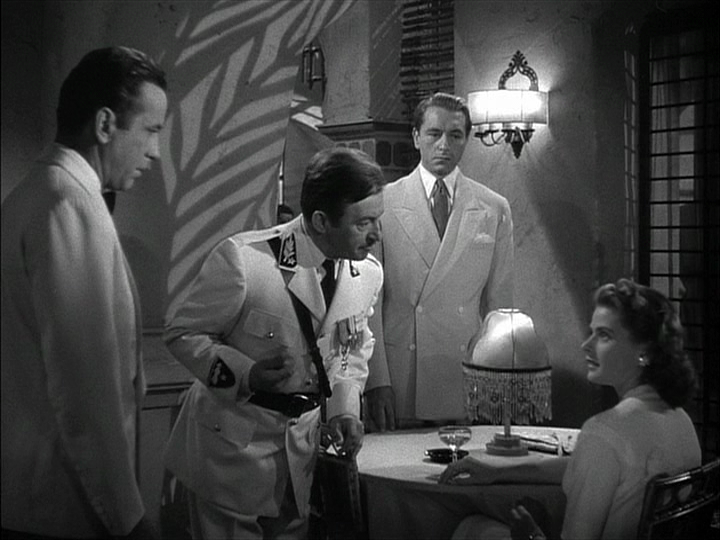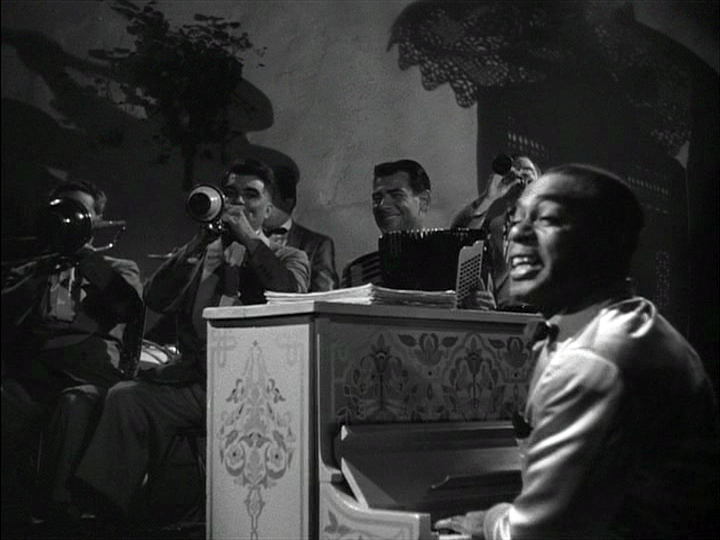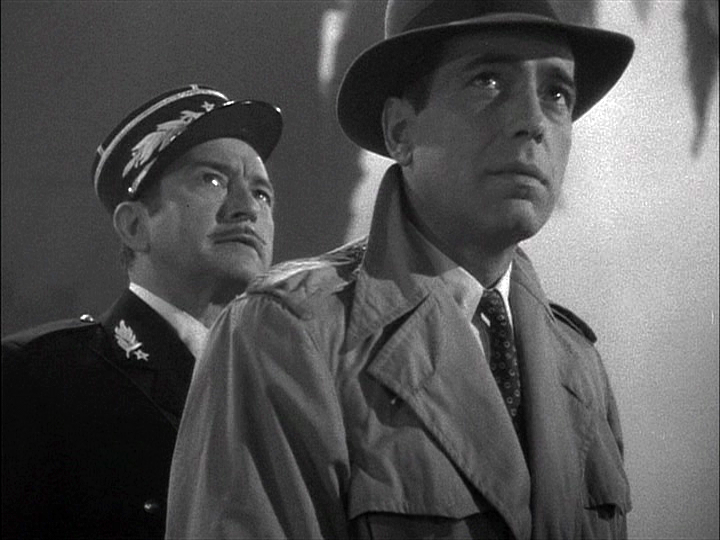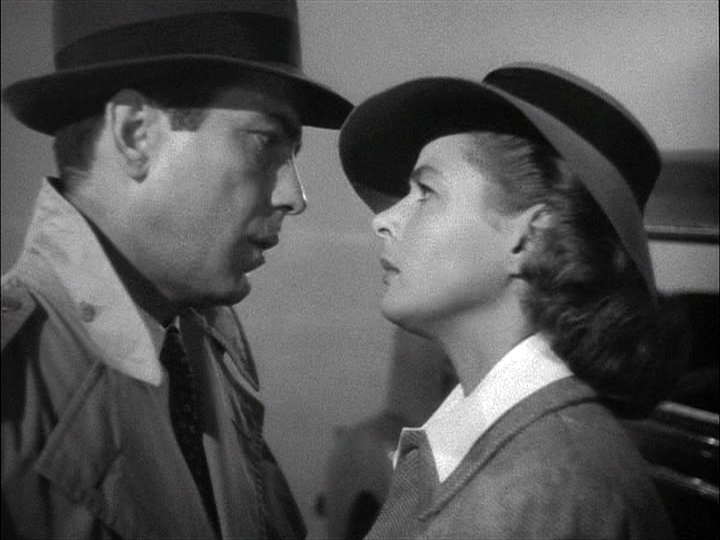Casablanca, 1942, Warner Bros. Starring Humphrey Bogart, Ingrid Bergman, Paul Heinreid, Claude Rains. Directed by Michael Curtiz. B&W, 102 minutes.
In Casablanca, those displaced by the ravages of war find edgy refuge while waiting for the day they can leave for safer shores. Lonely nights are often spent at Rick’s Café Americain, where gruff proprietor Rick Blaine (Humphrey Bogart) maintains a low profile and artfully dodges political ties. His past is a mystery to all, but is about to revisit him.
One evening local thief Ugarte (Peter Lorre) pulls Rick aside to tell him he has two letters of transit, objects of much interest to local authorities since the men carrying them were murdered. He entrusts them to Rick shortly before being arrested and killed by local authorities, who are left in the dark as to the location of the letters. They are important, as they allow the bearers unquestioned passage from Casablanca to safer territory.

Humphrey Bogart, Claude Rains, Paul Heinreid, Ingrid Bergman
The letters of transit are in great demand by a number of people wishing to leave Casablanca, including two who only recently arrived, resistance leader Victor Laszlo (Paul Heinreid) and his wife, Ilsa (Ingrid Bergman). Ilsa holds a large number of confidences, including one she has kept from her husband. Several years before, when France was still free from Nazi tyranny, she and Rick were living in Paris and deeply in love.
It soon becomes an open secret Rick holds the letters of transit, and he is of two minds about how to use them. Caught between his desire for Ilsa and the knowledge that destroying her marriage would have consequences far greater than the dissolution of the relationship, Rick waivers in placing his dedication.

Dooley Wilson
Casablanca was nominated for eight Academy Awards and won three, Best Picture, Best Director and Best Adapted Screenplay. The additional nominations were for Best Actor (Bogart), Best Supporting Actor (Claude Rains), Best Film Editing, Best Score and Best Cinematography.
The script for Casablanca was famously incomplete when shooting began, with writers Julius and Philip G. Epstein sometimes hastily finishing a day’s scenes the night before. This proved frustrating for the actors, in particular, Ingrid Bergman, who later said she was unsure who she was supposed to be in love with. While the Epsteins knew from the beginning who Ilsa would end up with, she did not, and it left her insecure about her role.
That uncertainty about where her character’s devotion lies may have led to her quiet expression, devoid of much emotion, throughout the film. She later wrote, “In Casablanca, there was often nothing in my face, nothing at all. But the audience put into my face what they thought I was giving. They were inventing my thoughts the way they wanted them; they were doing the acting for me.”

Claude Rains, Humphrey Bogart
There are multiple inconsistencies and implausible components in the film, but audiences then and now seem to care very little about them. There is also at least one glaring fictional plot element: the famous letters of transit were actually objects devised by the writers of the rarely-produced play (Everybody Comes to Rick’s) that the film is based on, and didn’t exist in the real world. Similar documents allowing diplomats to leave a country after war was declared did exist, and exit visas, also referred to in the film, were real (although unusual), but the letters of transit were a complete fabrication.
This is the rare film that provides a brooding and quiet tension throughout, a tension that is not contrived, as World War II was raging and so many in the cast were European or British (including Bergman, Heinreid, Lorre and Rains). Casablanca grabs you from the opening scene to the final words uttered. There are a hundred hokey lines that somehow work even today, a tough yet tender leading man, a beautiful, mysterious leading lady and a half-dozen secondary characters who keep from becoming stereotypes. It is romance balanced with the fears and reality of war, but in the end, the romance is what saves all.

Knew you would eventually get to a review of Casablanca…also was certain it would be a splendid one and that it is! thank you, Belinda!
LikeLiked by 1 person
Thank you! I waited to do this one, and I’m glad I did.
LikeLiked by 1 person
Bogey was my guy so I loved this film! Have you reviewed Maltese Falcon? Another great one. But then, I am not the reviewer….. 😀
LikeLiked by 1 person
Oh yes, I reviewed The Maltese Falcon. I love that movie! It was one of my earlier posts…the search feature on this blog is “behind” the three lines in the upper left-hand corner.
LikeLiked by 1 person
Oh, what a great review you did! I didn’t know about all the other actors….and talk about a directing debut! wow. Thanks for letting me know about this, Belinda.
LikeLiked by 1 person
Sure!! I also have my actors/actresses directory, where you can see all the films I’ve reviewed that star or co-star particular people. And yes, what a directing debut!!
LikeLiked by 1 person
I’m not as in love with this film as everyone else is, but I still do like it.
LikeLiked by 1 person
It’s a good movie. One of those films where everything came together…but I understand no film is going to be everyone’s favorite.
LikeLiked by 1 person
[…] Bogart’s leading man career, and is rumored to have later turned down the part of Rick in Casablanca. A rumor that is just as likely to be a good story as the truth, but it is a good […]
LikeLike
[…] film had elements of Casablanca in its supporting characters and secondary story lines, with the trusted piano player, the […]
LikeLike
[…] Academy Award for Best Supporting Actor. The film was also nominated for Best Picture (losing to Casablanca), Best Director, Best Actress in a Leading Role for Arthur, Best Writing – Original Story and […]
LikeLike
[…] This is a charming movie with an incongruous plot, but reality is hardly necessary here. Morgan is dashing as the sailor who is as attracted to Elizabeth as she is to him, but believes her to be married. Greenstreet plays the pompous millionaire motivated solely by financial gain to great effect; his voice and presence lend themselves as well to this light comedy as they did to dramas such as The Maltese Falcon and Casablanca. […]
LikeLike
[…] Another carryover from Captain Blood was Rathbone, a match for Flynn in physique, style and fencing abilities. His look was well-suited for a foe of the hero, and his height and build made him visually a fine opponent for Flynn. Rains’ versatility as an actor is once again highlighted. He is barely recognizable from his characters in such films as Now, Voyager and Casablanca. […]
LikeLike
Brilliant review! yes, love does save it all!
I recently watched Casablanca for the first time and this makes me appreciate a whole lot more. Thanks 🙂
Even I thought I’d write down how I feel about it…here goes
https://motionpictureaficionado.wordpress.com/2018/02/23/casablanca-1942-the-germans-wore-gray-and-she-wore-blue/
Check it out if you feel like it!
LikeLiked by 1 person
I absolutely will check it out! One of the great pleasures of having a movie blog is discovering other movie blogs.
LikeLike
[…] Casablanca […]
LikeLike